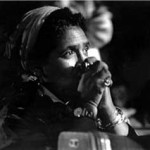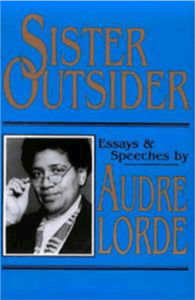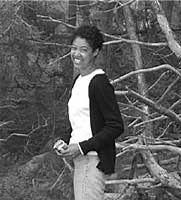The Vision of Audre Lorde
by Rima Vesely
 Audre Lorde (1934-1992) has been intrinsically important to the development of second wave U.S. feminism. Author of 15 books of poetry and prose, she was Poet Laureate of New York State from 1991-1993.
Audre Lorde (1934-1992) has been intrinsically important to the development of second wave U.S. feminism. Author of 15 books of poetry and prose, she was Poet Laureate of New York State from 1991-1993.
She consistently challenged racism, sexism, classism and homophobia, serving as a catalyst for change within and among social movements, in which she herself participated: Black Arts and Black Liberation, Women’s Liberation, and Lesbian and Gay Liberation. A staunch internationalist, she connected women across the U.S.A., the Caribbean, Europe, South Africa, Australia, and New Zealand. She died in 1992 after a courageous struggle against breast and liver cancer. (Credit: Jennifer Abod)
Warriors battling to claim the authentic fullness of daily life are given an inside view into person and legacy of Lorde in “The Edge of Each Other’s Battles: The Vision of Audre Lorde,” a recently-released documentary produced by Jennifer Abod. The film, which depicts a four-day conference held in 1990, highlights the enduring relevance of Lorde’s work in international, feminist, and lesbian/gay movements. At the center of “The Edge of Each Other’s Battles” is the complexity of women’s relationships with one another, particularly the personal and political dynamics that race, culture, class, and sexuality create amongst all women committed to liberation from a patriarchal status quo.
The sixty-minute film is meant to use Lorde’s work in oppressed communities today. In the ten years since Lorde’s death from cancer, her poetry and prose continue to be a dynamic force in organizing across differences in order to honor the complexity of our individual selves as well as form a united movement in a racist, misogynistic America. The documentary begins by recognizing Lorde’s desire that the conference be intentionally focused on bringing together women who, traditionally separated by race, culture, class, nationality, and sexuality, were able to speak to one another about the truth of their lives.
 Creating the space for women to be complex individuals committed to liberation on an international level is the legacy of Audre Lorde. Self-reflection, creative and productive uses of anger, and telling the truth of daily life as women of color in racist America were themes spoken of throughout the film by numerous women claiming the courage to live boldly. Highlighted throughout the film are interviews with Lorde and references to her work, most notably her book of essays and speeches, Sister Outsider.
Creating the space for women to be complex individuals committed to liberation on an international level is the legacy of Audre Lorde. Self-reflection, creative and productive uses of anger, and telling the truth of daily life as women of color in racist America were themes spoken of throughout the film by numerous women claiming the courage to live boldly. Highlighted throughout the film are interviews with Lorde and references to her work, most notably her book of essays and speeches, Sister Outsider.
To hear the words of Lorde, a woman who battled to claim herself and to salvage her beauty in a world that did not recognizer the complexity of her identity, was deeply affirming. As Lorde spoke at the conference, the profundity of her strength was evident. “I love you,” she said. “To be able to love and to recognize what love means: Not total acceptance, not blind acceptance, but recognition. To recognize that we move against a common enemy does not mean that we beat the same drum or play the same tune. It means that we are committed to a future.”
Also interspersed with Lorde’s words, clips from the conference, and poetry by women attending the conference are interviews with conference organizers whose process of organizing the event revealed just how deeply Lorde’s commitment to difference impacted them. White organizers spoke of the need to step back and listen to women of color, and the disappointment they experienced at the failure of various white women to respect the organizers’ commitment to a gathering that was fifty percent women of color and low-income women. The event was, for many, a resistance to the middle-class mainstream women’s movement over decades, as space was intentionally made for women of color rather than white women to be primary speakers, presenters, and voices. Several women of color, through poetry, spoke of being attacked through economic policies and white men, as well as their ability to claim their persons in a violently racist society. In the midst of the conference, when organizers were told that many attendees did not feel enough space to speak, organizers rearranged the format for conversation and feedback.
Lorde affirmed such response and creativity on the part of the organizers. Her commitment to change and to be changed is a continuous theme throughout her written work. In her essay “Uses of Anger,” Lorde writes: “What woman here is so enamored of her own oppression that she cannot see her heelprint upon another woman’s face? What woman’s terms of oppression have become precious and necessary to her as a ticket into the fold of the righteous, away from the cold winds of self-scrutiny?”
For those of us who listen to Lorde’s challenge as Christians listen to Biblical text, the film provided a necessary entrance into the intensity of her words. I am now able to read her words and hear her voice, envision her face and body as she was interviewed and speaking on stage.
For those of us who listen to Lorde’s challenge as Christians listen to Biblical text, the film provided a necessary entrance into the intensity of her words. I am now able to read her words and hear her voice, envision her face and body as she was interviewed and speaking on stage. Yet the one part of the film that could have been further developed was access to Lorde’s work itself. While reference was made to Lorde’s poem “Power” in an interview, Lorde did not read the poem, nor did she read any of her work.
Despite the fact that Lorde’s poetry and essays were not quoted in the documentary, the film gives us, in its entirety, a vision of what the world might be if we were to talk about the truth of our lives and express without fear our commitment to freedom. The hurt, anger, beauty, and fierceness that leads to change and wakefulness are possible and necessary. This commitment to complexity, as we “find our work and do it,” is what leads us into the future.

 Rima Vesely is a poet and writer based in Los Angeles, Cal. A Witness contributing editor, she writes regularly on issues of racism, immigration and incarceration.
Rima Vesely is a poet and writer based in Los Angeles, Cal. A Witness contributing editor, she writes regularly on issues of racism, immigration and incarceration.
Ed. Note: The filmmaker also produced a CD in 1988 called “Audre Lorde: An Audio Profile” (60min.), which has aired on community radio stations and in classrooms around the world. On it Lorde reads from her own work, both poetry and essays, and talks about the origins of some of her work and the inspiration for her self-definition. It includes interviews with Adrienne Rich, Alice Walker, and other writers and scholars.